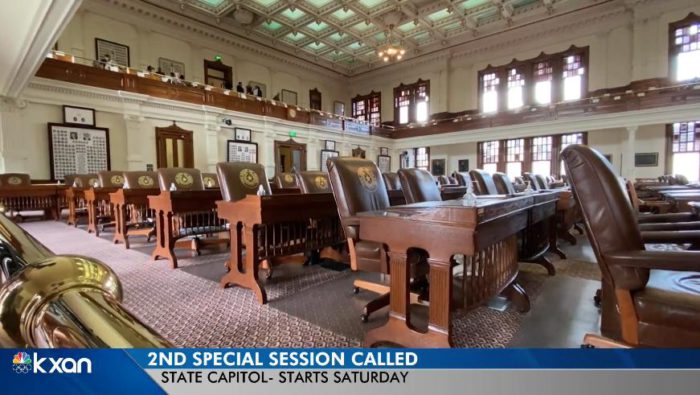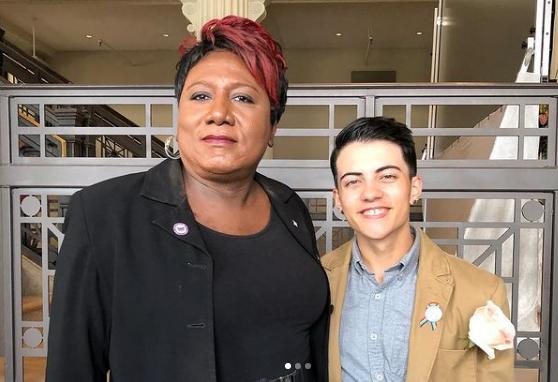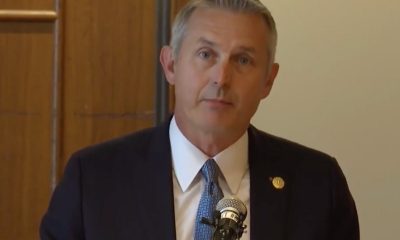Politics
Texas governor calls for 2nd special session, anti-trans bill on agenda
Democrat lawmakers said they plan return but they will not return to the Texas Capitol to attend any future special sessions called by Abbott

AUSTIN – In a statement released Thursday, Texas Republican Governor Greg Abbott announced that he was calling the state legislature back into a second special session commencing at noon on Saturday—twelve hours after the first special session ends.
The first special session ends at 11:59 p.m. on Friday and was effectively stalled in taking legislative action after the majority of the Democratic Texas House Caucus boarded flights to Washington D.C. on July 12 and have remained out of state denying Republicans from a quorum.
Abbott released a 17-item agenda expanding his priorities like the election bill that caused the House Democrats to flee the state at the start of the first special session, which ends Friday. But it also features six additions, including the spending of federal COVID-19 relief funds and potentially changing the legislative rules regarding quorums, the Texas Tribune reported.
There is also a new item on public education during the pandemic including masks which is an increasingly volatile issue as parents prepare to send their kids back to school with the virus on the rise statewide.
Among the Governor’s legislative priorities is once again focused on denying Transgender youth in the Lone Star state the ability to participate in athletics on teams or intermural sports in their chosen gender.
“Legislation identical to Senate Bill 29 as passed by the Texas Senate in the
From the Proclamation by texas governor greg abbott published thursday, august 5, 2021
87th Legislature, Regular Session, disallowing a student from competing in
University Interscholastic League athletic competitions designated for the sex
opposite to the student’s sex at birth.”
Trans teen activist Landon Richie told the Blade Thursday that “Once again, Governor Abbott is wasting money, time, resources, and energy on attacking trans youth in sports – kids who just want to be a part of a team and spend time with their friends. What trans kids – and adults – are told by this announcement is that the state’s leadership has no regard for our well-being, safety, or lives,” he said.

“What we need instead is to be treated not as second-class citizens, but as the valuable, beautiful, loved people that we are. The Governor would rather make it harder for trans kids to live, for people of color to vote, for students to learn about systemic racism, for immigrants to seek safety, and for people to access reproductive healthcare in our state than to protect us from COVID and extreme weather events; his actions will not be forgotten when it’s time to vote him out in 2022,” Richie added.
Photo: Late journalist and Trans activist Monica Roberts with Landon Richie
The Tribune also reported that with Thursday’s announcement, Abbott is following through on a statement he made toward the start of the quorum break, saying he would make sure the second special began the day after the first one ends. For the second special session, lawmakers will have to start over on every item, including filing bills and holding committee hearings.
Democrats and Republicans remain at a stalemate over the elections bill, which would restrict local voting options and place new statewide rules on early voting and mail-in ballots. GOP leaders have suggested they are not in the mood to further tweak the bill, while House Democrats have abandoned hope for meaningful negotiations while using their time in the nation’s capital to advocate for federal voting rights legislation.
Abbott and the legislative Republican leadership have been thwarted from passage of their agenda as the Texas Democratic lawmakers have blocked every effort by the GOP in advancing bills through to the governor. f
First in the end of the regular legislative session in May, they walked off the state House floor, leaving Republicans without the quorum they needed to approve the voting legislation in the final hours before a midnight deadline. Then in July by leaving the state altogether.
The push to pass the elections reform legislation comes as Republicans in Texas have sought to join Florida, Georgia and other GOP-controlled states that have seized on former President Donald Trump’s lies about the 2020 election and adopted new restrictions that will make it harder for some of their residents to vote CNN reported.
Texas House Democrats say that they remain steadfast in their opposition to Abbott’s agenda and will likely stay in Washington where they have held a number of meetings with other Democrats including Vice President Kamala Harris, Senate Majority Leader Chuck Schumer. This past week CNN reported that the Texas Democratic lawmakers were joined by more than 100 state legislators from across the country as part of a planned “week of action” on voting rights.
“A vast majority, enough to break quorum, have committed to each other to not be in the Capitol when the second called session happens,” said state Representative Eddie Rodriguez, (D-51) who serves on the House Committees on Calendars, State Affairs and Ways & Means.
Other lawmakers indicated that while they eventually plan return to Texas have told multiple media outlets that they will not return to the Texas Capitol to attend any future special sessions called by Abbott.
Gov. Greg Abbott announces plans for a second special session, 17 agenda items
Congress
Congress passes ‘Big, Beautiful Bill’ with massive cuts to health insurance coverage
Roughly 1.8 million LGBTQ Americans rely on Medicaid

The “Big, Beautiful Bill” heads to President Donald Trump’s desk following the vote by the Republican majority in the U.S. House of Representatives Thursday, which saw two nays from GOP members and unified opposition from the entire Democratic caucus.
To partially offset the cost of tax breaks that disproportionately favor the wealthy, the bill contains massive cuts to Medicaid and social safety net programs like food assistance for the poor while adding a projected $3.3 billion to the deficit.
Policy wise, the signature legislation of Trump’s second term rolls back clean energy tax credits passed under the Biden-Harris administration while beefing up funding for defense and border security.
Roughly 13 percent of LGBTQ adults in the U.S., about 1.8 million people, rely on Medicaid as their primary health insurer, compared to seven percent of non-LGBTQ adults, according to the UCLA School of Law’s Williams Institute think tank on sexual orientation and gender identities.
In total, the Congressional Budget Office estimates the cuts will cause more than 10 million Americans to lose their coverage under Medicaid and anywhere from three to five million to lose their care under Affordable Care Act marketplace plans.
A number of Republicans in the House and Senate opposed the bill reasoning that they might face political consequences for taking away access to healthcare for, particularly, low-income Americans who rely on Medicaid. Poorer voters flocked to Trump in last year’s presidential election, exit polls show.
A provision that would have blocked the use of federal funds to reimburse medical care for transgender youth was blocked by the Senate Parliamentarian and ultimately struck from the legislation — reportedly after the first trans member of Congress, U.S. Rep. Sarah McBride (D-Del.) and the first lesbian U.S. senator, Tammy Baldwin (D-Wis.), shored up unified opposition to the proposal among Congressional Democrats.
Congress
Ritchie Torres says he is unlikely to run for NY governor
One poll showed gay Democratic congressman nearly tied with Kathy Hochul

Gay Democratic Congressman Ritchie Torres of New York is unlikely to challenge New York Gov. Kathy Hochul (D) in the state’s next gubernatorial race, he said during an appearance Wednesday on MSNBC’s “Morning Joe.”
“I’m unlikely to run for governor,” he said. ““I feel like the assault that we’ve seen on the social safety net in the Bronx is so unprecedented. It’s so overwhelming that I’m going to keep my focus on Washington, D.C.”
Torres and Hochul were nearly tied in a poll this spring of likely Democratic voters in New York City, fueling speculation that the congressman might run. A Siena College poll, however, found Hochul leading with a wider margin.
Back in D.C., the congressman and his colleagues are unified in their opposition to President Donald Trump’s signature legislation, the “Big Beautiful Bill,” which heads back to the House after passing the Senate by one vote this week.
To pay for tax cuts that disproportionately advantage the ultra-wealthy and large corporations, the president and Congressional Republicans have proposed massive cuts to Medicaid and other social programs.
A provision in the Senate version of the bill that would have blocked the use of federal funds to reimburse medical care for transgender youth was blocked by the Senate Parliamentarian and ultimately struck from the legislation, reportedly after pressure from transgender U.S. Rep. Sarah McBride (D-Del.) and lesbian U.S. Sen. Tammy Baldwin (D-Wis.).
Torres on “Morning Joe” said, “The so-called Big Beautiful Bill represents a betrayal of the working people of America and nowhere more so than in the Bronx,” adding, “It’s going to destabilize every health care provider, every hospital.”
Congress
House Democrats oppose Bessent’s removal of SOGI from discrimination complaint forms
Congressional Equality Caucus sharply criticized move

A letter issued last week by a group of House Democrats objects to Treasury Secretary Scott Bessent’s removal of sexual orientation and gender identity as bases for sex discrimination complaints in several Equal Employment Opportunity forms.
Bessent, who is gay, is the highest ranking openly LGBTQ official in American history and the second out Cabinet member next to Pete Buttigieg, who served as transportation secretary during the Biden-Harris administration.
The signatories to the letter include a few out members of Congress, Congressional Equality Caucus chair and co-chairs Mark Takano (Calif.), Ritchie Torres (N.Y.), and Becca Balint (Vt.), along with U.S. Reps. Nikema Williams (Ga.), Hank Johnson (Ga.), Raja Krishnamoorthi (Ill.), Delia Ramirez (Ill.), Joyce Beatty (Ohio), Lloyd Doggett (Texas), Eleanor Holmes Norton (D.C.), Josh Gottheimer (N.J.), and Sylvia Garcia (D-Texas).
The letter explains the “critical role” played by the EEO given the strictures and limits on how federal employees can find recourse for unlawful workplace discrimination — namely, without the ability to file complaints directly with the Employment Opportunity Commission or otherwise engage with the agency unless the complainant “appeal[s] an agency’s decision following the agency’s investigation or request[s] a hearing before an administrative judge.”
“Your attempt to remove ‘gender identity’ and ‘sexual orientation’ as bases for sex discrimination complaints in numerous Equal Employment Opportunity (EEO) forms will create unnecessary hurdles to employees filing EEO complaints and undermine enforcement of federal employee’s nondiscrimination protections,” the members wrote in their letter.
They further explain the legal basis behind LGBTQ inclusive nondiscrimination protections for federal employees in the EEOC’s decisions in Macy v. Holder (2012) and Baldwin v. Foxx (2015) and the U.S. Supreme Court’s decision in Bostock v. Clayton County (2020).
“It appears that these changes may be an attempt by the department to dissuade employees from reporting gender identity and sexual orientation discrimination,” the lawmakers wrote. “Without forms clearly enumerating gender identity and sexual orientation as forms of sex discrimination, the average employee who experiences these forms of discrimination may see these forms and not realize that the discrimination they experienced was unlawful and something that they can report and seek recourse for.”
“A more alarming view would be that the department no longer plans to fulfill its legal obligations to investigate complaints of gender identity and sexual orientation and ensure its
employees are working in an environment free from these forms of discrimination,” they added.
-

 U.S. Supreme Court2 days ago
U.S. Supreme Court2 days agoSupreme Court to consider bans on trans athletes in school sports
-

 Out & About2 days ago
Out & About2 days agoCelebrate the Fourth of July the gay way!
-

 Virginia2 days ago
Virginia2 days agoVa. court allows conversion therapy despite law banning it
-

 Maryland4 days ago
Maryland4 days agoLGBTQ suicide prevention hotline option is going away. Here’s where else to go in Md.












